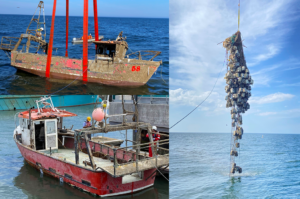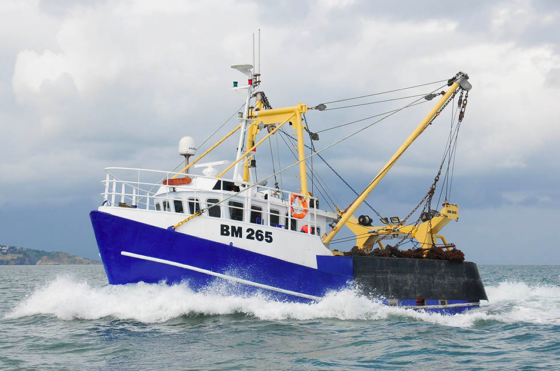
MAIB warns about modifications, and liferafts, as two investigations published

“Modifications, unless properly planned, can significantly erode a vessel’s margin of stability,” says Andrew Moll, chief inspector of marine accidents. “It is essential that skippers know the limitations of their vessels, and that any modifications to the vessel or changes to fishing methods are properly assessed and approved before fishing resumes.”
Plus, he says: “Lifesaving appliances are just that – for saving life, so it is vital that such equipment will function correctly in the event of an emergency,” and “this issue reaches beyond the fishing industry to any vessel carrying a ‘non-SOLAS’ liferaft.”
These warnings come in the aftermath of two reports issued by MAIB, the Marine Accident Investigation Branch.
They make tragic reading.
The first is about the scallop dredger Joanna C, which capsized south of Newhaven in November 2020, only one of the three crew survived.
Joanna C’s crew was hauling the gear when they noticed that the starboard dredge bar had become snagged on a line of whelk pots. The snag caused a heel to starboard from which the vessel could not recover, and it capsized rapidly.
MAIB’s investigation found that through-life modifications, with extensive alterations in 2019, had reduced Joanna C’s previously good stability to a state where it had very low reserves of positive stability and increased vulnerability to capsize. The effect of the modifications was unknown to the crew and regulator alike because, although a stability assessment had begun after the 2019 modifications, the analysis was never completed, and the vessel was free to continue operation.
During the capsize of Joanna C, says MAIB, the mate was thrown into the water and the skipper later managed to escape as the vessel sank; however, the deckhand remained trapped inside. The vessel’s liferaft did not inflate during the accident because the uninflated liferaft had insufficient buoyancy to initiate the inflation mechanism.
Nicola Faith extensively modified
The second report details the foundering of the whelk potter Nicola Faith (pictured above), resulting in three fatalities.
Nicola Faith capsized and sank in January 2021, 1.9 miles north of Rhos-on-Sea, north Wales.
The vessel had been extensively modified during its life which had significantly reduced its margin of positive stability, says MAIB. On the day of the accident Nicola Faith had been loaded with catch and retrieved strings of pots to the point of instability, which resulted in the capsize and subsequently sinking of the vessel. Nicola Faith had not been fitted with a mandatory emergency beacon to alert to the capsize, and it was not reported as overdue until 10:00 the next day.
“Both were small fishing vessels that capsized while working fishing gear and together, tragically, they account for the loss of five lives,” says Moll. “There are important lessons about stability from these accidents that must be understood and acted upon by all small fishing boat operators.
“The scallop dredger Joanna C had been modified, but the process of assessing the effect of the alterations had not been completed before the vessel returned to fishing. Unfortunately, the modifications had eroded Joanna C’s stability to the extent that simply snagging a dredge on a string of pots was enough to capsize the vessel. Tragically, only one of the three crew survived the accident. It is essential that skippers know the limitations of their vessels, and that any modifications to the vessel or changes to fishing methods are properly assessed and approved before fishing resumes.
“Any vessel can become unstable if overloaded. Nicola Faith had been modified, and the modification had not been approved. Nonetheless, the vessel could have been operated safely with care. On the day of the accident, the crew were relocating their pots to a new area and were carrying a full day’s catch as well. The combined weight of the catch and fishing gear piled on deck was far more than the boat was designed to carry; it capsized, and all three crew were lost in that accident. Fishermen will always be tempted to land a big catch but moving fishing gear at the same time can be overwhelming.
“As fuel prices soar, the temptation to carry more and do fewer trips makes economic sense, but where stability is concerned the results can be catastrophic,” warns Moll.
“Five families’ lives have been shattered by these two accidents, both of which were entirely avoidable. To all fishing vessel crews I have this simple message: Safety begins with good stability; know your boat’s limitations and operate within them.”
Safety issues identified
Following its salvage by MAIB, a thorough inspection of Nicola Faith was carried out to determine why it might have capsized. A full assessment of its stability was undertaken.
The key safety issues identified in the Nicola Faith report were:
- Nicola Faith was operated in an unsafe manner and was loaded with a combination of catch and retrieved fishing gear to the point of instability.
- A mandatory Emergency Position Indicating Radio Beacon (EPIRB) was not fitted to the vessel and the crew were not equipped with personal locator beacons.
- Nicola Faith was found to have been extensively modified; these modifications had eroded its margin of positive stability.
Maritime and Coastguard Agency surveyors had noted some of the modifications but the guidance about modifications (that would have triggered a stability assessment) was not sufficiently clear.
Although available on board, the crew did not routinely wear personal flotation devices.
The key safety issues identified in the Joanna C report were:
- Reserves of stability are critical to allow fishing vessels to operate safely and ensure recovery back to upright from a heel induced by the environmental conditions or a snagging. Joanna C’s very low margin of positive stability left the vessel extremely vulnerable to capsize.
- Liferafts fitted for ‘float-free’ operation must have sufficient buoyancy in the uninflated state to activate the inflation mechanism. Although a buoyancy standard existed for larger SOLAS liferafts there was no corresponding requirement for smaller, non-SOLAS liferafts such as those fitted to fishing vessels.
Liferaft warnings
The absence of a liferaft adversely affected the survivability of the crew in the sea after the vessel sank, says MAIB.
“Joanna C capsized because it had insufficient reserves of stability to recover from the heel created when the fishing gear became snagged. This happened because of modifications to the vessel that had severely eroded its stability characteristics, and this went undetected,” says Moll.
“Of equal importance, I want to highlight the findings of our investigation regarding Joanna C’s liferaft. This issue reaches beyond the fishing industry to any vessel carrying a ‘non-SOLAS’ liferaft.
“Unfortunately, Joanna C’s ‘float-free’ liferaft arrangements did not work as expected.
“Although the liferaft was released from its cradle as the vessel sank, it did not come to the surface and inflate. This significantly impacted the chances of survival for the two crew in the water, only one of whom survived. The MAIB’s investigation found that the uninflated liferaft had insufficient buoyancy to trigger the gas inflation system, leaving it suspended mid-water still attached to the sunken vessel.
“Furthermore, the liferaft had not been manufactured to meet any specific standard, although this was acceptable for a small fishing vessel at the time. Prior to publication of today’s report, an immediate MAIB recommendation was made to amend the International Standard Organisation’s standard for non-SOLAS liferafts (known as ISO-9650) to ensure they have sufficient buoyancy in the uninflated state to activate the inflation mechanism, where ‘float-free’ arrangements are in place.
“The safety message is that it is vital to ensure that lifesaving appliances will work as expected. Where ‘float-free’ arrangements are in place, the liferaft must have sufficient buoyancy to trigger the inflation mechanism once it has been released from the cradle as the vessel sinks.”
Read the full report on Joanna C, and on Nicola Faith.
 Joanna C
Joanna C